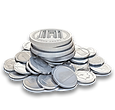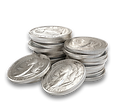What Is the Value of Old Coins? 5 Key Tips to Sell Them for More
- GoldsilverJapan

- Jun 21, 2025
- 4 min read
Are you wondering if the old coins in your drawer are worth anything? The truth is, the value of old coins can vary dramatically based on factors like age, metal content, rarity, and condition. Whether you inherited a coin collection, picked up a few interesting pieces over the years, or simply want to know more before selling, this guide is for you.
In this post, we’ll break down what determines a coin’s value and share 5 practical tips to help you sell your old coins for the best possible price.
1. What Determines the Value of Old Coins? (Metal, Date, Certification)
Several factors influence how much your coins may be worth:
● Metal Content
Coins made from precious metals like silver or gold often carry an intrinsic melt value. For example:
A Morgan Silver Dollar (1878–1921) contains roughly 0.773 oz of silver, which alone gives it a base value tied to the spot price of silver.
British Gold Sovereigns contain about 0.2354 oz of gold, making them highly desirable among both investors and collectors.
● Year, Mintage, and Historical Relevance
Coins from key years or those with low mintages tend to be more valuable. A 1909-S VDB Lincoln cent, for example, can fetch hundreds or even thousands depending on condition due to its low mintage and collector demand.
● Condition and Grading
Condition is everything in numismatics. A coin graded MS-65 (Mint State) can be worth 5–10 times more than the same coin in circulated condition. Third-party grading services like NGC and PCGS give coins credibility and maximize resale value.
2. Popular Old Coins and Their Market Values
Here's a look at some commonly collected coins and their general market ranges (as of 2024). Note that values may change depending on condition and market trends.
Coin Type | Notable Features | Price Range (approx.) |
Morgan Silver Dollar (1878–1921) | U.S. classic, 90% silver, popular worldwide | $30 – $1,000+ |
Peace Dollar (1921–1935) | Post-WWI silver dollar | $25 – $500+ |
British Gold Sovereign | Historical gold bullion coin | $450 – $800+ |
Indian Head Cent (1859–1909) | Early U.S. penny, copper-nickel/bronze | $3 – $1,000+ |
Pre-1965 U.S. Quarters/Dimes | 90% silver content | Melt value or higher |
Early Canadian Silver Coins | King George V/VI era, 80% silver | $5 – $200+ |
If you’re unsure what your coin is, it’s worth identifying it before assuming it’s common or low in value.
3. Beware of Counterfeits and Damaged Coins
Not all old coins are valuable—and not all valuable-looking coins are genuine. Here are a few watch-outs:
🔍 Counterfeits: Common with gold coins, rare date silver dollars, and ancient coins. Look out for incorrect weight, size, or magnetic properties (precious metals are non-magnetic).
❌ Damaged Coins: Cleaning, holes, corrosion, or rim dings can dramatically reduce a coin's value—even rare ones.
⚠️ Reproductions: Coins labeled “copy” or made for commemorative purposes may have no numismatic value.
If you suspect a coin is rare but aren’t sure, always seek a professional evaluation before selling or dismissing it.
4. How to Sell Old Coins for the Best Price
Selling coins isn’t just about finding a buyer—it’s about finding the right buyer at the right time. Here are five key strategies to get the most from your collection:
✅ 1. Get a Professional Appraisal
Don’t guess—get your coins evaluated by an expert. Dealers or certified numismatists can help identify the coins, assess grade, and estimate market value. Many reputable companies offer free online or in-person appraisals.
✅ 2. Know the Current Market
Check recent auction results, price guides, or online platforms like eBay (sold listings only!) to gauge current values. Silver and gold coins will also fluctuate based on live metal prices.
✅ 3. Sell Coins Individually (Not in Bulk)
While it’s tempting to sell your whole collection quickly, valuable coins can get lost in a bulk deal. Separate higher-value items and sell them individually or with clear photos and descriptions.
✅ 4. Avoid Cleaning Your Coins
It may seem like polishing a coin improves its look, but cleaning often reduces its numismatic value. Leave patina and toning as they are, especially on older silver or copper coins.
✅ 5. Choose a Reputable Buyer
Pawn shops and general antique stores may undervalue your coins. Instead, consider:
Specialized coin dealers
Online marketplaces with reviews
Certified precious metal buyers
Trusted numismatic platforms like GoldSilverJapan
5. Sell Smart: Use a Trusted Coin Buyer like GoldSilverJapan
Looking to sell your coins with confidence? At GoldSilverJapan, we specialize in the purchase of:
U.S. and international silver coins
Gold sovereigns and bullion issues
Certified (NGC/PCGS) collectible coins
Pre-1965 silver coins and commemorative issues
We offer:
💬 Free appraisals by coin experts
💰 Competitive offers based on current market prices
📦 Secure shipping support for remote sellers
🔒 Transparent, fast payment processing
Final Thoughts
Old coins are more than just outdated currency—they’re pieces of history, stores of value, and for many, lifelong passions. Whether you’ve got a single Morgan dollar or a full shoebox of global coins, don’t overlook their potential value.
The key is knowing what you have, understanding the market, and choosing the right partner to sell with.
Start with an expert evaluation—and unlock the true worth of your collection today.











Comments